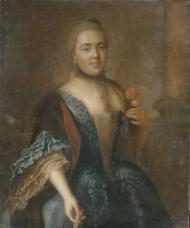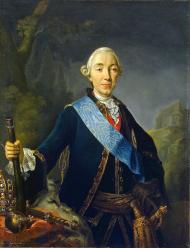Who dated ?
Peter III of Russia dated from ? until ?. The age gap was 11 years, 6 months and 14 days.

Peter III of Russia

Peter III Fyodorovich (Russian: Пётр III Фёдорович, romanized: Pyotr III Fyodorovich; 21 February [O.S. 10 February] 1728 – 17 July [O.S. 6 July] 1762) was Emperor of Russia from 5 January 1762 until 9 July of the same year, when he was overthrown by his wife, Catherine II (the Great). He was born in the German city of Kiel as Charles Peter Ulrich of Schleswig-Holstein-Gottorp (German: Karl Peter Ulrich von Schleswig-Holstein-Gottorp), the grandson of Peter the Great and great-grandson of Charles XI of Sweden.
After a 186-day reign, Peter III was overthrown in a palace coup d'état orchestrated by his wife, and soon died under unclear circumstances. The official cause proposed by Catherine's new government was that he died due to hemorrhoids. However, this explanation was met with skepticism, both in Russia and abroad, with notable critics such as Voltaire and d'Alembert expressing doubt about the plausibility of death from such a condition.
The personality and activities of Peter III were long disregarded by historians and his figure was seen as purely negative, but since the 1990s, after the dissolution of the Soviet Union, more attention has been directed at the decrees he signed. His most notable reforms were the abolition of the secret police, exemption of nobles from compulsory military service, confiscation of church lands, and equalisation of all religions. He also put an end to the persecution of the Old Believers and made the killing of serfs by landowners punishable by exile. Although he is mostly criticised for undoing Russian gains in the Seven Years' War by forming an alliance with Prussia, Catherine continued it and many of his other policies.
After Peter III's death, many impostors thrived, pretending to be him, the most famous of whom were Yemelyan Pugachev and the "Montenegerin Tsar Peter III" (Stephan the Little).
Read more...